This is a very long post, about my trip abroad, so I’ve broken it up by date, and you can read a bit at a time. Sadly, I don’t have pictures of all the places I visited.
February 13-16, LIONS AND TIGERS AND LEOPARDS, OH MY!
I got in late on a chilly damp Saturday and lounged for a day or so. Unfortunately, I came with a bad cold and wasn’t up to getting to the theater, although there are quite a few plays that I wanted to see. A new coffee bar has opened about half a mile from my hotel, with the best cappuccino I’ve ever drunk in London—Tomtom’s, on the corner of Elizabeth and Ebury Streets. One morning when I had an hour to spare I hiked over to Charing Cross Road and tried Vergnano’s, also very good, but a cold place compared to Tomtom’s
A fabulous dinner on the 15th with my English agent, David Grossman, and his wife, and then on Tuesday, Kerry Hood from Hodder took me to a wildlife preserve in Kent, dedicated to endangered big cats. It’s a breeding preserve that works with zoos and nature parks around the world. We got a private tour, where we were allowed to pet lions (back of the hand against the fence so as not to have a loose finger sticking through—that is definitely lunch on the foot.
One lion licked the back of my hand, the tongue incredibly rough. I backed away instinctively and found blood on my hand—just a scrape. The volunteer showing us around said their tongues are rough enough to strip flesh from bone. I wanted to show everyone my wound, by way of bragging that I was as tough as V I, but I hadn’t been courageous enough to hold my hand still for a real scrape—so my little nick healed way too fast.
It was quite wonderful to be so close to these animals, with just a fence separating us. My pictures didn’t turn out too well—I hoped I would have one of the lion’s open mouth when it got fed up with—well, perhaps, not feeding on me—and began roaring in earnest. We saw about 30 different species of cat, including the small, ultra-shy Pallas cats—the oldest known feline species, dating back about 12 million years.
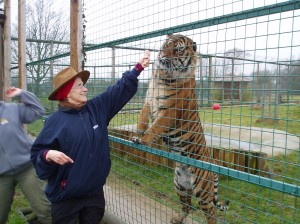
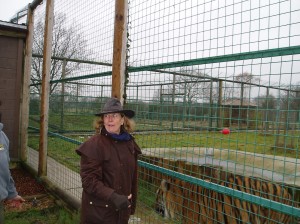
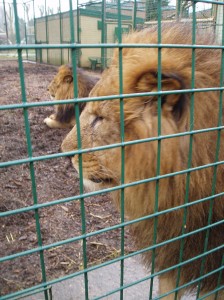
THE TOUR BEGINS
February 17-18
The tour began with media in London, lunch with some old friends, like Barry Forshaw, and some new acquaintances, including the Guardian’s Claire Armistead, who runs their new podcast feature, and is the face behind the Guardian’s twittering. Print journalism is as hard hit in the UK as it is in the US, but British newspapers are still putting out substantial editions every day. However, the Guardian has 10 times the online readership as it does in print—so the paper, like so many others, is trying new new media approaches, and also, scratching its head over how to charge for content on line.
The evening of the 18th was one of the tour highlights for me—on stage at the Royal Festival Hall with Val McDermid. Val is one of the most generous and knowledgeable crime writers around, and we had a great 90 minutes together in front of about 300 readers.
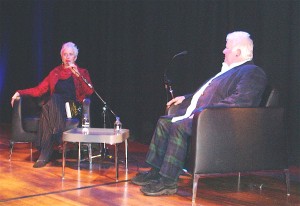
A TOUR DE FORCE, et de GRANDE VITESSE
February 19-25
Like every tour I’ve done for Hodder, everything was well organized and well executed. Working closely with bookstores and libraries, Hodder was able to set up events that averaged over 100 attendees, which made it feel worth my while to go such a distance for a tour.
The English tour took place in a wide range of venues, from the Watermill Theatre in Newbury, where a theater has been built around a medieval water wheel, to a village hall near Hadrian’s Wall in the north of England, where the program had to end at two sharp so that tables could be put away and carpets laid down for the regular weekly “Carpet Bowling” tournament.
By the way, Pat Harper, who pleaded nerves a while back, was a brilliant presenter and co-conspirator at the Watermill. And she brought chocolate, as promised. What a trouper.
Mostly Books, a hardworking little bookstore in Abingdon, holds events at the Guildhall in the abbey close. It’s an unapologetic tribute to Baroque architecture, with gilt paint and an ornate ceiling that kept distracting me while I read.
In Milton Keynes, a woman who used to own a bookstore in Botswana came up to say “hey.” She became good friends with some Chicago friends of mine, Jean Fishbeck and Judy Popovich, when Judy went to Botswana to help establish a school of nursing there.
At the Hexham Village Hall, the event sponsored by Cogito Books, I met a woman named Liesbeth Langford, whose Dutch father lived underground during World War II—his role in the resistance was to find homes for Jewish children living in hiding, and to move them at a moment’s notice if neighbors were betraying them. Cogito’s Alan Grint published the woman’s memoir of her father’s work, Written by Candlelight. My left-hand partner told me about a French acquaintance who delivered false papers to wanted people in occupied France—she carried them in her bicycle, stuck inside groceries, and rode with great insouciance through the French countryside. Altogether a very emotionally moving lunch.
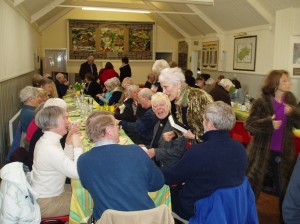
In Cambridge, I got hopelessly lost and was very nearly late for my evening event—absolutely maddening, racing around the streets. And in Newcastle, a bus would have demolished me if the driver hadn’t been more alert than I—he braked about twenty inches from my non-functioning head.
The Newcastle Public Library is six months old and a dream building, all glass, so that inside one feels the light in all the spaces designed for readers and books to get together.
At Ely, a woman asked me to inscribe a book for a friend who is seriously depressed, and then added, “V I is too tough to be likable.” I wondered if she hopes V I’s toughness will be a rebuke or a goad to her depressed friend, but I just signed the book without comment, as one must.
In York, I met a woman from Iran who came with her daughter; they worried about what is happening in their home country, with the arrests and the clamping down again by the hardliners. In Nottingham, on a cold wet day, Ann Giles, the Bookwitch, made the long trek from the middle of England for a brief chat before I was whisked off to Scarborough, where a heavy snowfall had put down six inches of new snow by morning. The streets and sidewalks were too slick to make it down to the oceanfront. And Scarborough Fair is a long time in the past, now.
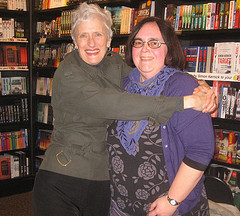
The UK is holding elections in early May. The media coverage is tame by US standards—thank heaven—but charges and counter-charges fill the air, including the role of the Conservatives’ media specialist in invading private e-mails of thousands of public figures, and allegations that the Labour Prime Minister is so vicious to his staff that they called a bullying hotline for help.
Meeting friends for drinks one night, we saw a sign in a bar that reads, “Don’t be a Tosser.” A lovely word, tosser, meaning a kind of jerk. I keep repeating it to myself when I feel a bout of tossiness coming on.
HALF A LEAGUE ONWARD
February 26, London-Simferopol.
I had to be up by 3:45, but the night before an early rising I don’t sleep well, so I finally got up at 3 and did my exercises. I do at least 20 minutes every morning to keep my neck in shape, and to stretch out my legs, but I did think I was a bit strange, doing my routine so compulsively that early in the day.
I then hopped blear-eyed into a cab to go to Heathrow. Arriving obediently 2 hours ahead of my international flight, I instead had to wait for an hour for the terminal to open. Sigh. And then a long travel day, arriving ten hours later in Simferopol.
My cousin Barb, and her neighbor’s son, Serdar Seytaptiev, waited anxiously on the other side of customs while I stood in a very slow queue. Somehow I was at its tail-end, and then, not speaking Russian, and the immigration official not speaking English, we had a long ordeal of me trying to explain why I was visiting the country at all. It reminded me of my student days, visiting Bratislava and East Berlin at the height of the cold war—the tarmac packed with soldiers, the terminal a grim grey Stalinesque building, empty of any amenities, and only some dozen flights in and out all day, most to other old USSR destinations.
However, I finally got past all the barriers. And there were Barb and Serdar. A friend of the Seytaptiev family had kindly offered to drive. Cars are scarce in Crimea, where the average monthly income is $185 USD, and gas (petrol) averages $4 a gallon, so this was far more than run-of-the-mill generosity. The roads are quite unforgiving, as many are unpaved and are pitted with deep ruts. These turn into slippery clay at any rainfall, and the ruts themselves become arroyos.
The Seytaptiev family—Lenora, Neshet and the two children, Serdar and Safie—invited us to dinner, an amazing meal of salad, pasta with turkey and mushrooms, smoked salmon, and then plates of chocolate and cookies—which are whipped out on all occasions, as I learned during my brief stay.
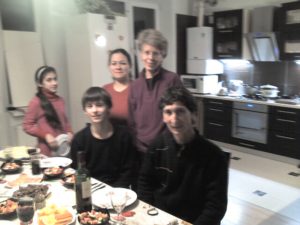
Despite my jetlag and my long travel day, I was so enchanted with the warmth of Barb’s new neighbors that we stayed up quite late, talking. Only Serdar speaks enough English for me to communicate, but between Barb, who works hard at her Russian, and my old dictionary, and everyone’s good will, we had a pleasant evening.
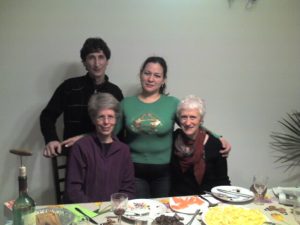
February 27, Simferopol
Barb took me on her favorite walk today, up into the hills above Simferopol, where we could sit on a bluff overlooking the city and all the little pockets of houses being built.
Barb lives in a Crimean Tatar quarter called Ak Mechet. In some ways, Ak Mechet is like a western pioneer town, with pitted rutted roads, garbage everywhere, houses in every state of construction or dilapidation. Everyone just digs out a hole for a foundation and starts building on top of it. And they build their own houses, out of stone, do all the plastering, wiring, plumbing themselves—pitching in the way American pioneers did—and coming up with quite wonderful dwellings.
The garbage is depressing, but I think of the beach where I take my dog in the summer—every morning it is absolutely plastered with bottles, plastic bags, used Pampers. The city sends a crew around each morning to clean it, but it is disgusting that we need a crew, that people can’t pick up after themselves. And in Chicago, we have garbage cans and a Streets and Sanitation crew to empty them—infrastructure which is lacking in a country without money.
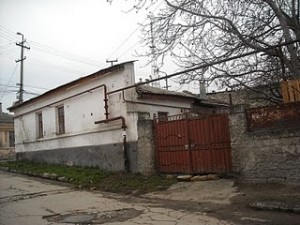
We had coffee with Barb’s landlady, who lives next door –literally—the two houses are about a yard apart. Her daughter joined us. Both women are accountants, and we had a merry time struggling in pigeon Russian and the daughter’s bits of English—but communicating amazingly well.
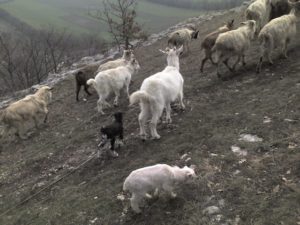
The house where Barb lives was the landlady’s home until a few years ago, when she and her husband put up a newer bigger one and began renting out the old one. Compared to many in Crimea, or perhaps New York City, Barb has a lot of room, three main rooms, a kitchen-bath, and a utility room. The house contains five iron beds, a desk top, a dining room table, a number of plastic chairs and stools and a stove. One of Barb’s co-workers, a Crimean Tatar, lives in one room with no running water and only a hotplate for cooking. She’s been living there for 15 years, on a waiting list for better housing supposedly set aside for returning Crimean Tatars.
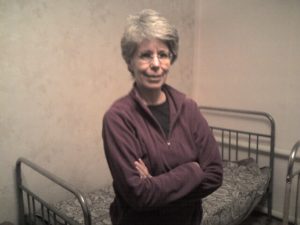
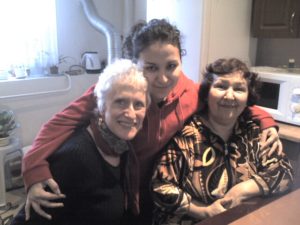
The Peace Corps wants volunteers to live in their communities, and in the same way members of the community do. So—even if Barb could afford a car, she shouldn’t own or drive one. And like much of Ak Mechet, she has water between 5 in the morning, when the person in charge of the subdivision’s water gets up to turn it on, and about 11 a.m. Laundry is done by hand—so you can imagine, it’s not done often. There is no garbage collection, but there is plentiful heat, with the ubiquitous gas pipes running above ground, since it was cheaper to build them up instead of underneath.
In the afternoon we went into the downtown, where I saw the outside of the library where Barb works three days a week. We then went to Ukraine’s most important library, the Franco, where we were greeted with amazing warmth by Natalia Lopanovskaya, who heads the foreign language section and dropped her own work to give her unexpected visitors a tour. The building is only two years old and is a fine modern place. Ms. Lopanovskaya speaks perfect English, and showed us their current exhibitions—one on French playwrights, and one on Isaac Asimov.
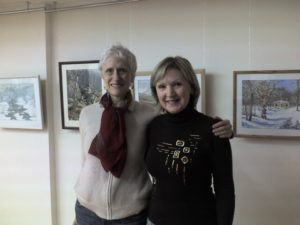
Outside the scene was less cheerful—we walked along the river, which also is filled with garbage, but even more depressing were the numbers of young people wandering around with the same dull hopeless faces I see in the poverty-ridden pockets of Chicago’s south side. No jobs, no prospects for finding them, a very hard row to hoe. And the concomitant drug and alcohol abuse that narcotizes people who feel hopeless. Unemployment runs at around 40 percent—which, by the way, is also true on Chicago’s south and west sides. What will we do with this generation globally, or locally? People like Barb are on the ground helping, and maybe the rest of us can do our part, too.
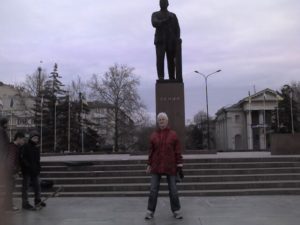
February 28, Bakhchisaray, Chyfyt-Kaleh
We got up bright and early and took the bus into town, where we picked up the bus to Bakhchisaray, where one of Crimea’s cave cities is carved into the mountainside. Ever since Barb wrote about these on her blog, I’ve been hoping to see one. I don’t know how they were built, but they are somewhat like pueblos, dwellings chiseled out of the mountains. Over their 1200-year history, successive groups lived in them, from the Mongolian Tatars who conquered the peninsula, to a Jewish settlement, to Crimean Tatars. I am woefully ignorant about how or why these different peoples lived there, but we spent a wonderful day exploring the caves, hiking up from our bus stop about half a mile or a mile, and then wandering through the caves.
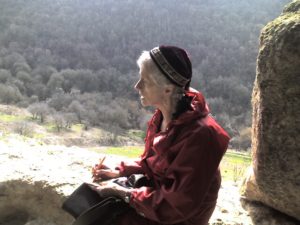
Chyfyt-Kaleh covers about a mile of ground, with a beehive of caves, some nesting inside or on top of each other. It’s the only one of the cave cities that still has some of the surface buildings still standing—a mausoleum for the wife of one of the khans, and what looks like perhaps a synagogue. If I follow up on my impulse to read about them, I’ll let you know what I learn.
We sat on the bluffs eating bread and cheese and looking out at the valleys. It was utterly quiet, except for the wind. You could hear the occasional car as it passed on a road some half mile below us, and the distant piping of a busker, but other than that, it was just us and the birds. Barb says in the summer it’s absolutely jam-packed, so I’m glad I got to go in the winter.
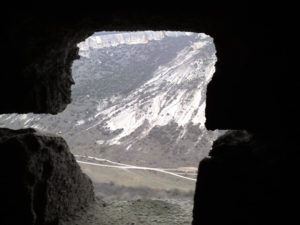
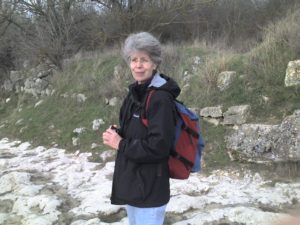
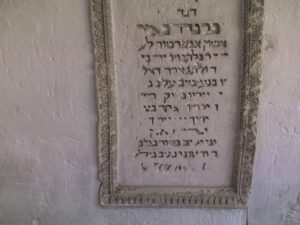
Outside Chyfyt-Kaleh an Orthodox church is built high into the rock, and Barb and I climbed up to look at it, covering our heads and going into the back of the church, where a service of some kind was in progress. I had never been in an Orthodox church, so I joined in the bowing and crossing with the congregation—which rather flabbergasted Barb. I can’t explain why I did it, except the desire to experience rather than observe what goes on around me.
We then went to one of Crimea’s lovely historical sites, an intact palace of the last of the great Khans to rule the peninsula. We were rather worn out by our long hike and only wandered around the courtyard.
Back home, Barb cooked up a dinner of local groats with carrots and onions. She does a lot with a handful of pans and only a cooktop—years of camping in the wilderness has turned her into a wizard with few supplies. She is, by the way, an excellent cook.
We went across the street to the Seytaptievs, where we had dessert and hours of conversation.
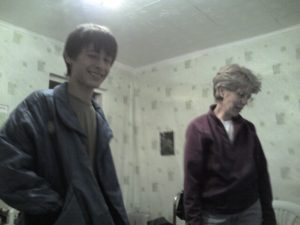
At one point, Serdar and I went into the family room and sat in front of the computer, talking about life and the possibility of friendship. Can you have a real friend, he asked, which I took to mean a true friend, someone truly on your wavelength, someone who does not lie to you or use you. He’s struggling with that right now in his life, but we all struggle with that. I assured him that it is possible to find real friends, but you are lucky if you find three or four in the course of a life—don’t expect that you will often find them. He reminds me so much of my own adolescent self, ardent, longing for the harmonies, in Frank Wilczek’s phrase, that being with him makes my heart turn over.
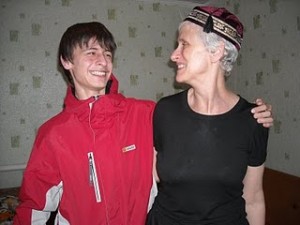
March 1, Yalta, Crimea
Barb took me to Yalta, so I could see Livadia Palace, where Stalin, Churchill and Roosevelt met in February, 1945, to carve up Europe.
Barb once again expertly navigated the confusing Crimean buses. We walked a mile across muddy rutted roads, through back yards, skirting the ubiquitous dogs—all running free, but all intent on their own doggy business, not curious about the humans passing among them—goats and chickens which graze along the verge, or peck in the garbage piles that dot the landscape, and came to a place where a bus appeared.
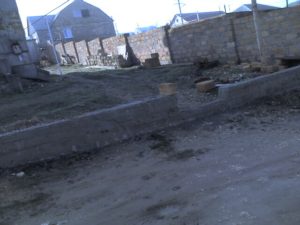
We rode that to one of Simferopol’s four main bus stations, where we caught a bus to the Yalta main bus station, 55 miles, or an hour and forty-five minutes, from Simferopol. We rode up and down winding mountain roads, but the fog was too thick to see the landscape, or the Black Sea when it (supposedly) appeared on the horizon.
Once in Yalta, we wandered along the main street, into little shops to find cheese, and the extremely delicious bread—a fresh-baked loaf costs less than 2 cents in US money—and fresh fruit, which you find everywhere as well. Then Barb once again put us onto a bus and got us off at what looked like the middle of nowhere—but was in fact the top to a flight of stairs leading down to Livadia Palace.
Please don’t be imagining Greyhound buses. These are little vans that grind up and down the hills and streets of Crimea. They stop whenever somebody flags them down, and, when the bus is crowded, people hand money up and down the rows to the driver. Change is always delivered to the right person–like paying for beer at an American ballpark.
(Oddly, with this scrupulous honesty on the bus, there is unpleasant corruption in other areas, most notably, university diplomas. People recounted to me being offered the chance to buy their degree as soon as they enrolled in university, and Ukrainians say they try not to go to local doctors, because you don’t know who really studied medicine, and who bought a diploma.)
Livadia had once been the Tsar’s Black Sea vacation home. It’s surprisingly modest in size for an Imperial residence, built on a bluff overlooking the Black Sea, with extensive gardens now rather run down. There’s so little money in Crimea it’s hard for them to maintain public places and parks. Even though Yalta is further north than Minneapolis, the Black Sea gives it quite a temperate climate—palm trees thrive there, and the Tsar’s gardens have gigantic rhododendrons.
Roosevelt and Churchill gave Stalin carte blanche to take over Eastern Europe after the war. It was a painful feeling to stand looking at the terrace where the famous photograph was taken, knowing that American and European history of the last 65 years was set in motion that cold February day. The Cold War began there. The lines of the Iron Curtain were drawn, and five decades of suppression in eastern Europe set into motion.
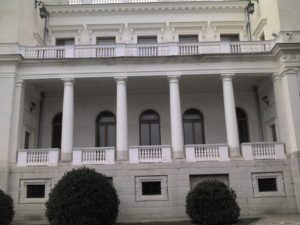
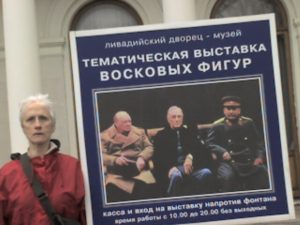
At the same time, the war was still being fought inch by bitter inch in the western theater, and it may have seemed impossible to Roosevelt and Churchill to summon the human and physical resources to push further east than into Germany. I don’t know, but the toll in human death and despair that came in the conference’s wake is difficult to think about.
The day my cousin and I spent there was chilly and overcast. We couldn’t see the mountains that ring the coast, and it was too chilly to enjoy walking along the esplanade. We took refuge in a quiet coffee bar, where we drank beautiful looking cappuccinos.
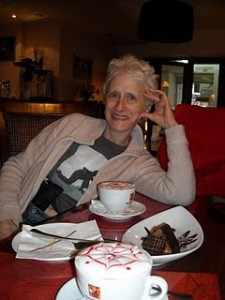
Chekhov and Pushkin both spent time at Yalta; Chekhov wrote one rather amusing story called, I believe, the Esplanade, set in that place, with one of his fussy hypochondriacs taking a seaside cure.
Back in Simferopol, we had dinner with two of Barb’s young American friends, one a Peace Corps volunteer, one a Fulbright scholar, working with local schools who are trying to revive the Crimean Tatar language among the current generation of children. We had lovely Indian curries in a nearly-empty restaurant, without much heat—another reminder of how much everyday comfort we take for granted is a luxury in a struggling economy.
And then another bus, another mile walk home, where we spent the rest of the evening with Serdar, Barb’s poetry-loving neighbor. He touched me greatly by giving me a beautiful edition of Pasternak’s poetry, in Russian, of course, which means I must try to learn enough Russian to read some of the poems. We sat up late talking, about life and poetry, and Ukraine, and Serdar’s longings to attend university in America. He so idealizes America that he has studied all our presidents. He asked me my favorite, and when I promptly said, “Lincoln,” his face brightened: his own favorite as well.
At one point my husband called us on Skype, and utterly charmed Serdar with his friendliness and his joking around. Serdar said no Ukrainian professor—let alone one of my husband’s distinction—would talk to a young person in such a friendly way—I forbore to say that not too many Americans would, either.
March 2, Simferopol, Crimea (Ukraine)
My cousin took me to the Gasprinsky Library to meet the staff and to give a presentation on my writing. Barb’s assignments for the Peace Corps include three days at Gasprinsky, one day at a children’s library, and one day with a group of artists who are trying to get grants to publish their work.
Among the 50 million or so people Stalin butchered were ten million in northern Ukraine—starved to death with calculated brutality. And in the south, in Crimea, the Tatars were decimated in a forced relocation to Uzbekistan in the 1940’s. It’s only been in the last twenty years that they’ve been allowed to return home.
The Dutch government helped restore the Crimean Tatar library in the 1990’s and it’s named for Gasprinsky, a Crimean Tatar who was important in modernizing Tatar writing and culture in the late 19th Century –he started the first Crimean Tatar newspaper, wrote books on politics and social history, advocated social equality for women. (Crimean Tatar is both a language, closely allied to Turkish, and a people.)
We met in the Reader’s Room, a small room with a portrait of Gasprinsky—who looks a bit like Chopin—and various Tatar artifacts hung on the walls—including a beautiful antique lace head scarf.
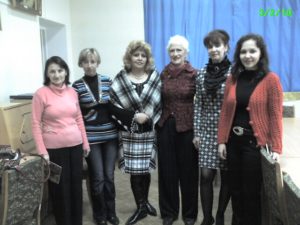
A young woman in the library did simultaneous translation—an astonishing act as far as I was concerned, murmuring English into my ear as the Russian speakers spoke, and turning my comments into Russian for the group. Natalia from the Franco library surprised us by showing up, very generously bringing a beautiful hyacinth—proof that spring will come one of these days—and a bag of lovely chocolates for me to carry home and use as inspiration in my writing—she had startled and flattered me by reading my website. She also told me that two of my books, Killing Orders and Bitter Medicine, were available in Russian—another surprise, since the Russians never let me know they were preparing a translation. (It would be crude to say they were pirated.)
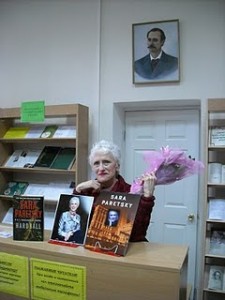
We spoke of the roles of women, of our wishes for women’s lives, and we spoke of Yalta and the Yalta conference. We spoke, too, of the great Russian poets and writers of the 19th and 20th century. I have a passion for the poets of the 1930’s and ‘40’s, most especially Osip Mandelstam and Anna Akhmatova, and it was the first time I was in a group of people who shared my love of her work—except they had the advantage of reading her in Russian, where all the nuances that get lost in translation are available for them. And they could quote her Requiem at length.
Afterwards the library staff entertained me to coffee and cakes—and chocolate, which, I am happy to report, is ubiquitous in Crimea. And then it was off to the airport, and the return flight to London and Chicago—which I almost missed because of the delay at the transit desk in Istanbul in issuing my boarding pass.
Neshet, Barb’s generous neighbor, drove us to the airport. It was hard to say goodbye to my cousin, but wonderful to be able to visualize her in her home, with her wonderful friends, and the streets and sights as she moves around Crimea.
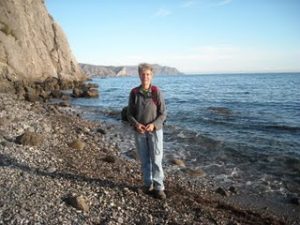
March 4, Home again.
I got home late on March 3, after spending 23 hours traveling—my body is a bit bewildered about where it is, but it’s good to be back. At Heathrow, clearing immigration, my bags were inspected and one officer pulled out a stretch band I use with my neck exercises. She was suspicious about what it was, but when I explained, she and her colleagues became interested, and we spent about ten minutes doing calisthenics before I boarded the final plane of my journey home.
I keep reflecting on Crimea, on the luxuries we take for granted–running water, veterinary care. On the public crises we share and share not dealing with–high unemployment, volatile nationalism. Above all, my cousin’s dauntless spirit, and the depth of her pleasure in the work she’s doing.

